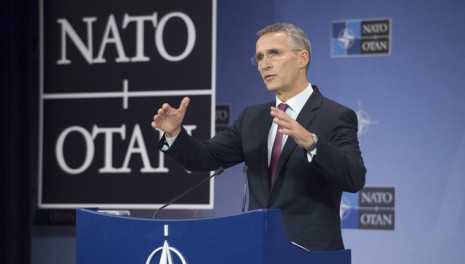Press conference
Szöveg: honvedelem.hu / nato.int | 2016. október 27. 9:45by NATO Secretary General Jens Stoltenberg following the meeting of the North Atlantic Council at the level of NATO Defence Ministers

Good evening.
We have just finished a productive meeting of the NATO defence ministers addressing deterrence and defence and how we are going to implement the decisions we made at the Warsaw Summit.
Protecting our almost one billion citizens is NATO’s primary responsibility.
At the Warsaw Summit in July, NATO leaders took decisions to ensure we continue to do so.
Over the past 100 days, we have come a long way in implementing those decisions. Today we assessed how far we have come. And the work that lies ahead.
Earlier this year, Canada, Germany, the United Kingdom and the United States each committed to lead a multinational battalion in the eastern part of the Alliance.
A transatlantic demonstration of rock-solid support for our Allies.
I am proud to announce that many other Allies confirmed contributions to these forces today.
Albania, Italy, Poland and Slovenia will contribute to the Canadian-led battalion in Latvia.
Belgium, Croatia, France, Luxembourg, Netherlands, and Norway will join the German-led battalion in Lithuania.
Denmark and France will contribute to the UK-led battalion in Estonia.
And Romania and the United Kingdom will join the US-led battalion in Poland.
Our forces will be truly multinational.
Sending an unmistakable message: NATO stands as one.
An attack on any Ally will be considered an attack on us all.
In Warsaw, we said that we expected to deploy the four battalions in early 2017.
I am pleased to confirm that we are on track.
This Alliance does what it says. And we deliver on our promises.
Today we also discussed progress in strengthening NATO’s presence in the Black Sea region.
With a Romanian-led multinational framework brigade on land.
And we are working on measures in the air and at sea.
And I’m pleased to confirm that several nations indicated their willingness to contribute to our presence in the Black Sea region, on land, at sea and in the air.
Including Canada, Germany, the Netherlands, Poland, Turkey and the United States.
Other Allies are also looking into how they can contribute.
During the meeting, we discussed recent military activity close to NATO’s borders.
Including the recent KAVKAZ 2016 exercise, and Russia’s deployment of Iskander missile systems to Kaliningrad.
We are concerned about Russia’s behaviour. But dialogue is even more important when tensions run high.
And Allies stand ready to hold an ambassadorial meeting of the NATO-Russia Council in the near future.
We also discussed the growing role of cyber defence for NATO.
In Warsaw, Allies pledged to strengthen their national cyber defences.
And today, we stressed the importance of making good on that pledge. So that we can show real results by the time of our next Summit.
Finally, new security challenges can mean new demands on our command structure.
It must be robust and agile, empowering the Alliance to continue to take quick and decisive action.
So we have decided to assemble a Senior Experts Group to support the Strategic Commanders in assessing the effectiveness of the NATO Command Structure.
We covered a lot of ground this afternoon. And I am encouraged by the progress we are making.
Guided by decisions made at the Warsaw Summit, NATO is adapting for the future.
To keep our people safe and our Alliance strong.